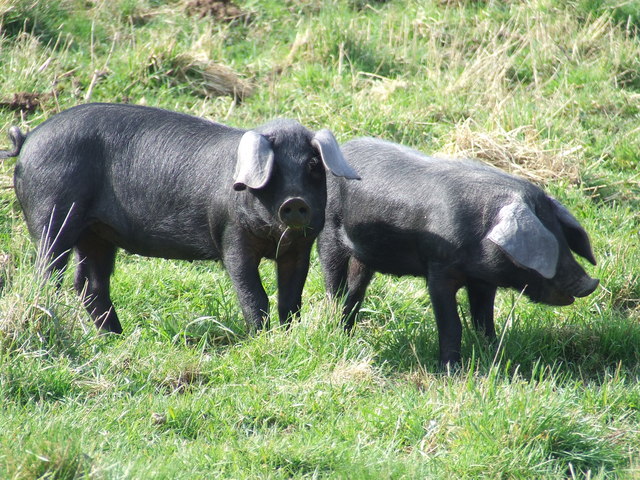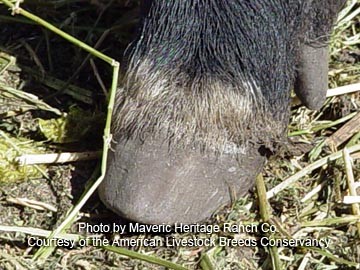 |
| Large Black Pigs |
When we decided to start raising pigs, we researched the different pig breeds to find a breed that would work well for our needs. We recognized that we live in a climate that can be hard on animals. (Hot sunny summers and cold, windy winters.) From previous experience, we knew that light colored pigs had a tendancy to sunburn. We also found that some pigs had little resilience to disease and that others had virtually no mothering ability. That was when we stumbled across the Berkshire pig. Being a black pig, it didn't sunburn, it thrived outdoors, and was very hearty. Everything we read about them said that they had great mothering instincts. We didn't find this to be entirely accurate but over time we were able to selectively bred mothering instincts back into our pigs. Berkshire pork is well known for being superior to commercial breeds of pork partly because of its well marbled, red colored, deeper flavored meat.
Over the last few decades as agriculture has progressed, farmers moved production indoors in order to be more efficient. I am sure most know how the story goes. Consumers wanted leaner pork and lower prices. In the process, the Berkshire sort of got left behind as it has more fat (aka flavor and juiciness), doesn't produce as large of litters and is slower growing. As commercial breeds were developed to be leaner and more efficient, the pork grew less flavorful and somewhat mushy (a result of only having an average living space of 6.8 ft2). Another unintended consequence was the potential for mass breakouts of antibiotic resistant superbugs; a result of pigs having subtherapeutic antibiotics mixed into their daily feed and water. This is the basic state of today's pork and for many the pendulum has swung too far opening up opportunities for our family farm and many others popping up all over the country.
Over the last few years, we have stayed busy raising purebred Berkshire pigs on pasture where pigs have an average living space of 2100 ft2. (Commercially you could raise 300 pigs in the same space that one of our pigs enjoys.) We have dedicated ourselves to raising our pigs humanely meaning gentle handling and herding of the pigs, no tail docking, teeth clipping, or nose rings, etc... We also believe in raising our animals naturally meaning no antibiotics, growth promoters/hormones, and only feeding our pigs a 100% vegetarian diet of Utah grown grains in addition to the pastures they graze. We believe that by adhering to these practices, we produce some of the best tasting and healthiest pork available. That said, we are excited to announce that we will be taking it up another notch by introducing two additional heritage breeds to our farm.
The heritage breeds of pigs that are black in color all have similar meat quality. The similarities are a deeper red colored pork that has more pronounced flavor as well as better marbling. They also have a higher quality of fat for rendering lard. The similarities are due to the fact that they share the same ancestry hundreds of years back. These characteristics are the reason that pork from these black heritage breeds are considered gourmet quality.
We have recently acquired two Large Black sows and two Mulefoot sows. The Large Black is known for having a shorter muscle fiber that makes the pork very tender. The Large Black can nearly support itself on pasture alone. The Mulefoot is perhaps the rarest breed in the country and was nearly extinct just a few years ago. It is now making a rather strong comeback thanks to it being named the best tasting pork in a blind taste test of the heritage breed pork. The Mulefoot pig is named for its unique hoof. Unlike all other breeds of pigs that have a split hoof, the Mulefoot pig has a solid horseshoe like hoof. We are excited to add the unique attributes of these pigs to the pork we are offering.
 |
| Here you can see the solid hoof of a Mulefoot |
Like other heritage breeds there are some "inefficiencies" with the breeds. Both breeds are relatively slow growing which also means that they consume more feed to reach a butcher weight than the commercial breeds. The Mulefoot also has rather small litters averaging only 5-6 piglets per litter. That said, we have witnessed firsthand their excellent mothering abilities, hardiness, and natural instinct to roam and graze on pasture. Besides, we have never approached our farm with the attitude of being the most efficient. Our goal has always been the to raise the finest quality, ethically and sustainably, and keep prices affordable for as many families as possible. We hope that you will continue to enjoy our pork as we seek to take it up another notch by embracing these heritage breeds of pigs.
